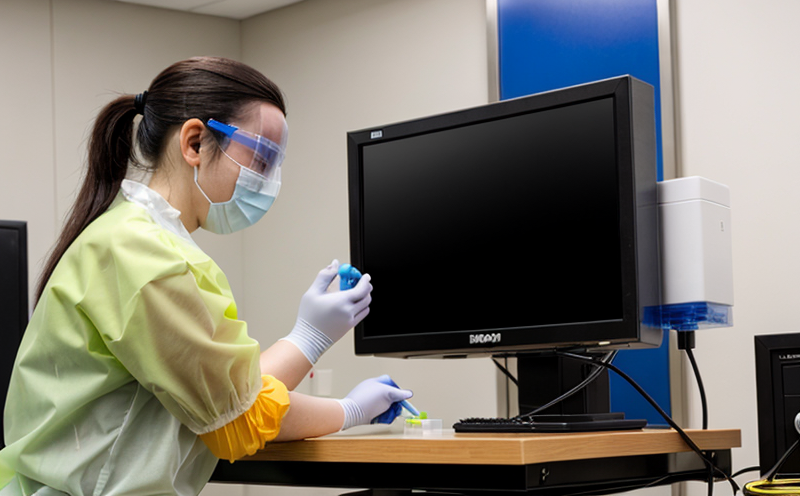Biocompatibility Testing of Absorbable Sutures
The biocompatibility testing of absorbable sutures is a critical step in ensuring that medical devices are safe and effective. This process evaluates the potential adverse effects of an absorbable suture when placed within or on living tissue over time. Our laboratory specializes in conducting biocompatibility tests for absorbable sutures, providing accurate and reliable results to our clients.
Our testing protocol includes a series of comprehensive evaluations that cover the following areas:
- Mechanical properties
- Cytotoxicity
- Substance leaching from the suture material
- Biodegradation and resorption characteristics
- In vivo evaluation for tissue reaction
The absorbable sutures we test are made from a variety of materials including polyglactin, polylactic acid (PLA), and polycaprolactone. Each material has unique properties that influence the suture’s performance in different applications.
Our laboratory uses state-of-the-art equipment to conduct these tests, which ensures precision and accuracy. The testing process typically takes several weeks to complete due to the need for thorough evaluation of each aspect of biocompatibility.
The results from our biocompatibility testing are crucial for medical device manufacturers as they provide insights into potential risks associated with their products. This information is essential in meeting regulatory requirements and ensuring patient safety.
In addition, we offer custom testing services tailored to the specific needs of our clients. Our team of experts can work closely with you to design a comprehensive biocompatibility testing plan that meets your unique requirements.
Applied Standards
We follow internationally recognized standards in conducting our biocompatibility tests for absorbable sutures. These include:
- ISO 10993-6:2009 – Biological Evaluation of Medical Devices Part 6: Cytotoxicity Testing
- ASTM F794-18 – Standard Practice for Determining the Biodegradation of Absorbable Materials in Physiologic Fluids
- EN ISO 10993-11:2015 – Biological Evaluation of Medical Devices Part 11: Substances Leaching from Implantable Medical Devices
- ISO 14687:2018 – Biodegradation and Resorption Characteristics of Absorbable Materials for Use in the Human Body
These standards provide a robust framework that ensures our testing methods are consistent, reliable, and aligned with global regulatory expectations.
The ISO 10993-6 standard specifically outlines the procedures for cytotoxicity tests, which involve evaluating the potential of absorbable sutures to cause cell damage or death. This test is critical in identifying any harmful substances that may be released into the surrounding tissue during use.
ASTM F794 focuses on biodegradation and resorption characteristics, providing a method for assessing how quickly the suture material breaks down within the body. This is particularly important for ensuring that the suture dissolves at an appropriate rate in accordance with medical guidelines.
The EN ISO 10993-11 standard addresses leaching of substances from the absorbable sutures, which helps to ensure that no harmful chemicals are released into the surrounding tissue. This is especially important for devices intended for long-term use or those in direct contact with sensitive tissues.
Finally, ISO 14687 provides a standardized approach to evaluating biodegradation and resorption characteristics of absorbable materials used within the human body. This ensures that manufacturers can reliably predict how their products will behave once implanted.
Customer Impact and Satisfaction
The impact of accurate biocompatibility testing is significant, both for our clients and ultimately for patients. Our rigorous testing process helps ensure that absorbable sutures meet the highest standards of safety and efficacy, thereby reducing risks associated with device failure or adverse reactions.
- Reduces potential risks to patients by identifying any harmful substances early in the development stage
- Ensures compliance with international regulations and guidelines
- Provides valuable insights into product performance under real-world conditions
- Aids in the continuous improvement of medical devices through detailed feedback on test results
- Enhances trust between manufacturers, regulatory bodies, and healthcare providers
- Contributes to better patient outcomes by ensuring reliable and safe medical products
We pride ourselves on delivering high-quality services that meet or exceed our clients' expectations. Our dedicated team of experts works closely with each client to understand their specific needs and deliver tailored solutions.
Your satisfaction is our priority, and we are committed to providing you with the best possible service. We offer competitive pricing, quick turnaround times, and exceptional customer support throughout the testing process. Whether you need assistance with initial design phases or require ongoing support during product development, we have the expertise to meet your needs.
Environmental and Sustainability Contributions
The biocompatibility of absorbable sutures not only impacts human health but also has significant environmental benefits. By ensuring that these materials degrade safely within the body, we help minimize waste in medical settings.
Absorbable sutures made from PLA or polycaprolactone are designed to break down naturally through enzymatic and hydrolytic processes once they have served their purpose in healing wounds. This reduces the need for additional surgical procedures to remove non-absorbable materials, which can be costly and time-consuming.
Our laboratory’s commitment to sustainability extends beyond just testing these products. We continuously strive to innovate and improve our methods, focusing on minimizing waste and promoting a more sustainable healthcare industry.





